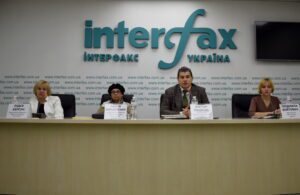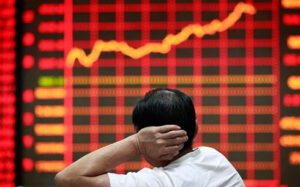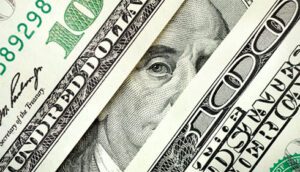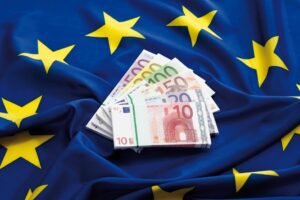
Stock indices of the largest Western European countries are changing weakly and multidirectionally at the beginning of the session on Wednesday.
Investors are assessing the latest data on business activity in the eurozone and waiting for the publication of the U.S. Federal Reserve’s November meeting minutes, which will be held on Wednesday evening.
At the last meeting the Federal Reserve increased the rate by 75 basis points and hinted at the possibility to reduce the rate rise at the next meetings. As experts expect, the protocol will show that the Fed leaders reached a consensus on the need to slow down the rate hike, writes Bloomberg. At the same time, however, there is no consensus among them as to what interest rate cap will lead to the beginning of the decline in economic activity and inflation.
The composite index of the largest companies in the region Stoxx Europe 600 by 10:40 a.m. decreased by 0.09% and was 435.94 points.
Germany’s DAX added 0.01%, France’s CAC 40 gained 0.03% and Britain’s FTSE 100 gained 0.4%. Meanwhile, Italy’s FTSE MIB and Spain’s IBEX 35 are down 0.6% and 0.2%, respectively.
The composite purchasing managers index (PMI) in the euro area in November rose to 47.8 points from 47.3 points in October, showed preliminary data from S & P Global, which calculates the indicator.
The value of the indicator below 50 points indicates a decrease in business activity in the sector. The index in the euro area remains below that mark for the fifth month in a row.
Germany’s composite PMI rose to 46.4 points this month from 45.1 points in October, the highest since August. Nevertheless its value indicates a decline in business activity for the third month in a row.
In France, the composite PMI in November fell to 48.8 points from 50.2 points a month earlier, according to preliminary data. The decline in business activity in the country was recorded for the first time since March 2021.
Share prices of Swiss bank Credit Suisse Group AG fell by 5.2%. The bank published the forecast for the fourth quarter of the current year, according to which it expects the pre-tax loss of $1.6 billion.
Papers of Johnson Matthey, a British chemical company, are falling by 3.1%. The company reported a decline in net profit in the first fiscal year.
Shares of Prosus NV of the Netherlands, which invests in tech companies, rise in price by 1.4%. The company grew revenues in the first fiscal half-year by 9% to $16.5 billion.
The value of United Utilities Group PLC, a British utilities provider, is up 0.1%. The company’s pre-tax profit doubled in the first fiscal year.
German carmaker Volkswagen AG dropped 1.9%. The company reached an agreement with the IG Metall union, which includes 125,000 VW employees, to raise their salaries and pay bonuses of 3,000 euros.

On November 22, at 11.30 a.m., a press conference organized by the Association “Protection of Injured Investors of Gostomel” was held in the press center of the Interfax-Ukraine news agency.
The participants were invited to participate:
The head of Gostomel military administration and the director of “Avtomagistral-Pivden” LLC did not appear in the press center hall.
The event was also attended by representatives of local media, as well as an online broadcast, which was watched by more than 300 media representatives.
The following issues were discussed during the press conference:
Human rights activist Victor Medvid began his story with the presentation of the affected party – two investors Lidia Khersun and Hanna Borshevska, who many years ago invested their money in the construction of capital housing and a detailed description of the reasons why they still cannot receive the specified housing, as well as other 130 families.
“The main problem is that the local government is not actually functioning. Due to the outbreak of the war, when the head of the Gostomel village council was killed, and after that, a military administration was established by presidential decree, the local self-government was actually suspended. Thus, the deputies are not performing their duties at the moment and the executive committee is not working,” said Mr. Medvid regarding the key reason for the crisis situation with housing construction in the Gostomel community.
“Since the newly appointed persons (employees of the military administration) have been working for only a few months, it was, I think, very difficult for them to understand all the issues of the community. In those problems, including the chronic problems of Gostomel, and given the lack of specialization, as, in principle, there should be businessmen, legal experts, etc., these people do not belong to these categories, and are trying to do everything “by force“: using force and not paying attention to the norms of the law and violations of the rights of individuals and legal entities. Of course, there is some justification for these actions: the fact that there is a war and quick decisions are needed, etc. But we need to be very careful to implement the necessary decisions so as not to harm,” the human rights activist stressed.
“There is a good enough factor that many outside observers, and other developers, and investors, and government officials – all were convinced that it is impossible to protect the rights, in this case, of the affected investors – individuals and legal entities – under martial law. It should be noted that this is not true. Indeed, this is problematic, as in fact, there are abuses by some persons, there is a “factor of the executor”, when the decrees of the President and the decrees of the Head of the military regional administration are not properly implemented. To be more precise, they are executed, but with relevant violations, and the violators refer to their leadership, in fact discrediting the leadership of the state, the leadership of the region, which is certainly unacceptable,” said Mr. Medvid.
“At the same time, the positive aspect is that the central state authorities – the Ministry of Regional Development, the regional military administration, where there are proper specialists who work professionally and are able to understand the situation in order to find the right legal solution. And now we have come, in principle, to resolve this conflict in a positive way in order to provide both affected investors and IDPs who are waiting for temporary housing in the modular town,” expressed his gratitude to the Head of the Kyiv Regional Military Administration Oleksiy Kuleba, First Deputy Dmytro Nazarenko and Head of the Department of Urban Development and Architecture Yaroslav Yanovych.
After Mr. Medvid explained the situation as to why the project of construction of residential buildings in Gostomel, which was launched more than 10 years ago, was constantly suspended, and why now there is a problem with providing 130 people, approximately 500 people with housing, due to the illegal actions of the head of the Gostomel military administration, representatives of the families of the affected investors also took the floor.
“In 2007, I invested money in the purchase of an apartment. Here is a certificate of payment. It has been 15 years since I invested the money, but I have not received anything. No apartment, no money. We were promised, constantly promised that we will be completed. We appealed, wrote, everything reached the military administration and everything was closed there. Now Mr. Victor (Vitruvia LLC) has bought and promised to finish our houses. We can say that he is our last hope,” says Lidia Khersun, an affected investor.
After the speech of the lawyer and representative of Vitruvia LLC Liudmyla Voytovych, who briefly told about the actions taken by the affected investors and the developer company, namely effective attempts to resolve the land conflict in the courts, Mr. Medvid shared his experience with other companies on how to protect the rights of investors even in times of war.
He noted that, first of all, a comprehensive legal approach led to a positive result.
“Many investors are afraid to invest in Ukraine because it is quite difficult to protect their rights. We have shown a good example: in 2 months we got positive court decisions, proper reaction of Bucha and Kyiv regional police, etc.”, – said the human rights activist.
Among the effective tools that helped to resolve the situation with the construction, he stressed the publicity – involvement of all victims in the protection of their rights, journalists, activists, residents of the territorial community and prompt appeal to the leadership of the region.
He also expressed hope that the preliminary agreements with the leaders of the Kyiv Regional Military Administration will be enough to resolve the housing issue for the benefit of both parties, both 500 affected investors and more than 100 IDPs who are waiting for the opportunity to move to the modular town.
Read more about the press conference:
More information about the situation can be found in the group “Protection of Gostomel Investors” and on YouTube channel,
where video evidence of illegal actions of the head of the Gostomel VA, the developer company “Avtomagistral-Pivden”, etc. is published.

Asian stock markets are increasing in the course of trading on Wednesday following the rise in U.S. stock indices a day earlier, while Japanese stock exchanges are not working in connection with a holiday in the country.
The exception is the Chinese mainland market which demonstrates weak negative dynamics because of the growing concern of traders about the increasing number of COVID-19 infections and restrictive measures introduced by the authorities, reports Trading Economics. Thus, since November 24 the Shanghai authorities are tightening the rules for people coming to the city.
The incidence of COVID-19 is rising across the country. On Tuesday, more than 28,000 new cases of infection were detected in China. The Chinese capital recorded more than 1,400 new cases of the coronavirus in a 24-hour period, the most for Beijing since the pandemic began.
China’s Shanghai Composite Index was down less than 0.1% by 7:01 a.m.
Leaders of the decline were tech and healthcare stocks, including Essence Information Technology (-20%), Shijiazhuang Yilin (-6.9%), Guangdong Zhongshe (-9.9%).
Hong Kong’s Hang Seng indicator was up 0.4% by 7:01 a.m.
Internet retailers Alibaba (SPB: BABA) and JD.com were the most significant risers on the Hong Kong Stock Exchange, up 3% and 2.2%, respectively.
Baidu Inc. (SPB: BIDU) is also up 2.6%. The Internet giant reported after the session the day before that its net loss fell sharply in the third quarter compared with the same period last year, while adjusted profit and revenue increased.
In addition, oil company CNOOC (+1.8%), real estate developer Longfor Group (+1.7%), Internet company Tencent (SPB: 700) (+1.4%) and insurance company Ping An Insurance (+1.3%) rose.
South Korea’s Kospi Index was up 0.4% by 6:57 a.m.
One of the world’s biggest chip and electronics maker Samsung Electronics Co. was up 0.5%, automaker Hyundai Motor – 0.3%.
Australia’s S&P/ASX 200 index added 0.6%.
Including rose shares of all the four largest banks in the country: the Commonwealth Bank of Australia and Australia & New Zealand Banking Group – 0.3%, Westpac Banking – 0.2%, National Australia Bank – 0.8%.
Stock prices of the world’s largest mining companies BHP and Rio Tinto rose by 0.9% and 0.1% respectively.
In addition, energy companies, including Woodside Energy (+1.1%) and Beach Energy (+2.6%) rose in value.

The U.S. dollar is getting cheaper against the euro, is stable against the British pound and rises against the Japanese yen in trading on Wednesday morning.
The ICE-calculated index showing the dollar’s dynamics against six currencies (euro, Swiss franc, yen, Canadian dollar, pound sterling and Swedish krona) is losing 0.13%, while the broader WSJ Dollar is down 0.03%.
The focus for traders this week is the minutes of the Federal Reserve’s November 1-2 meeting, at which the U.S. central bank raised its benchmark interest rate by 75 basis points (bps) and hinted at the possibility of a slowdown in its rate hike.
The minutes of the meeting will be published on Wednesday at 9 p.m. The experts expect the report to show that the Fed’s leaders reached a consensus on the need to slow the rate hike, Bloomberg wrote. However, there’s no consensus among them as to what interest rate cap will start to slow economic activity and lower the rate of inflation.
The euro/dollar pair is trading at $1.0329 as of 8:30 Moscow time, down from $1.0306 at the close of the previous session.
The dollar rose to 141.34 yen in trading against 141.22 yen on Tuesday.
The pound exchange rate was stable at the level of $1.1887 at the close of the previous session.
Meanwhile, the Chinese yuan was falling 0.19% against the dollar to settle at 7.1541 yuan per $1 as of 8:40 Moscow time. Investors are worried about new lockdowns in major Chinese cities because of a new outbreak of the coronavirus in the country which may trigger a slowdown in economic growth.

Ukraine on Tuesday received another EUR2.5 billion tranche under the current EU macro-financial assistance (MFF) program, the Finance Ministry said on its website.
“We are sincerely grateful to the EU for the financial support provided to Ukraine. The funds received will significantly help to ensure urgent state budget expenditures and maintain economic stability in the state,” the ministry quoted Minister Serhiy Marchenko as saying.
The total amount of the EU macrofinancial assistance to Ukraine has reached EUR6.7 billion since February 24, the Ministry of Finance said.
It is assumed that Ukraine will receive the last tranche within the framework of the eighth program of macrofinancial assistance by the end of this year, the ministry noted.
As earlier reported, in late May-early June this year, the EU pre-approved a new emergency macrofinancial assistance to Ukraine for EUR 9 billion, of which EUR 1 billion was allocated in early August. The rest EUR 8 billion was expected to come in one tranche, but the final decision was delayed. One of the reasons for that was a discussion of whether to provide the money in the form of loans or grants.
As a result, only EUR2 billion arrived in the middle of October, and the vice-president of the European Commission Valdis Dombrovskis said that the third tranche of EUR3 billion was expected in early December. Later he specified that EUR2,5 billion will arrive in the end of November and EUR0,5 billion – in the beginning of December, while the remaining EUR3 billion of the initial EUR9 billion is included in the new program of financial aid to Ukraine in 2023 for the total amount of EUR18 billion.
In all cases, we are talking about credit funds, but allocated on concessional terms.

In January-October 2022, the Zhidachevsk Paper and Pulp Mill (ZhPPM, Lviv region), which is part of the Osnova holding, increased its output by 21.7% compared to the same period of 2021 – up to UAH 413.38 million.
According to the statistic data given to “Interfax-Ukraine” agency by association “UkrPapir”, thus, according to the results of 10 months the rate of increase of this index to the similar period of last year slowed down a little bit (in nine months it was 23.2%, in eight – 30%).
The production of corrugated cardboard boxes in physical terms remains a stable positive trend, having increased by 29.5% – to 15.9 million square meters. At the same time the production of containerboard (including corrugated paper) decreased by 15.5% – to 10.7 thousand tons.
At the same time, there was a significant reduction in paper output – down 42% to 3,35 thousand tons.
As reported with reference to the Association, in January-October, the total production of paper and cardboard in Ukraine decreased by 44% compared to the same period last year – up to 415.8 thousand tons, corrugated board – by 41.5%, to 364.2 million square meters.
At the same time, Ukraine’s largest corrugated packaging manufacturer – Rubizhansky KTK received damage and stopped, but its subsidiary in the Kiev region – Trypolsky packaging plant continues to work. According to “UkrPapir”, over the 10 months it produced 1.78 billion UAH, and corrugated packaging made 102.4 million square meters (the second figure after the Kiev KBC).
ZhCBK had suspended production since the start of Russia’s military aggression, but production was resumed in March.
According to the Association, another plant within the Osnova holding, the Izmail Pulp and Paperboard Mill (Odessa region), increased its output by 3.6%, to UAH 190.8 mln in January-October. In volume terms, the production of containerboard decreased by 35.4% to 6.3 thousand tons, corrugated board by 43.8% to 9.7 million square meters.